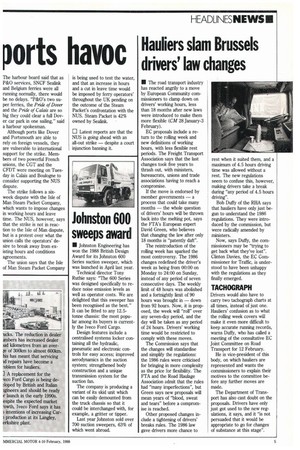Hauliers slam Brussels drivers' law changes
Page 7

If you've noticed an error in this article please click here to report it so we can fix it.
• The road transport industry has reacted angrily to a move by European Community commissioners to clamp down on drivers' working hours, less than 18 months after new laws were introduced to make them more flexible (CM 28 January-3 February).
EC proposals include a return to the rolling week and new definitions of working hours, with less flexible rest periods. The Freight Transport Association says that the last changes took five years to thrash out, with ministers, bureaucrats, unions and trade associations having to reach a compromise.
If the move is endorsed by member governments — a process that could take many months — the whole question of drivers' hours will be thrown back into the melting pot, says the FTA's European expert David Green, who believes that changing the law after only 18 months is "patently daft".
The reintroduction of the rolling week has sparked the most controversy. The 1986 changes redefined the driver's week as being from 00:00 on Monday to 24:00 on Sunday, instead of any period of seven consecutive days. The weekly limit of 48 hours was abolished and a fortnightly limit of 90 hours was brought in — down from 92 hours. Now, it is proposed, the week will "roll" over any seven-day period, and the day will be taken as any period of 24 hours. Drivers' working time would be restricted to comply with these moves.
The Commission says that the changes will standardise and simplify the regulations: the 1986 rules were criticised for bringing in more complexity as the price for flexibility. The FTA and the Road Haulage Association admit that the rules had "many imperfections", but Green says new proposals will mean years of "blood, sweat and tears" before a compromise is reached.
Other proposed changes include a tightening of drivers' breaks rules. The 1986 law gave drivers more chance to rest when it suited them, and a maximum of 4.5 hours driving time was allowed without a rest. The new regulations seem to confuse this, however, making drivers take a break during "any period of 4.5 hours driving".
Bob Duffy of the RI-IA says that hauliers have only just begun to understand the 1986 regulations. They were introduced by the commission, but were radically amended by ministers.
Now, says Duffy, the commissioners may be "trying to get back what they've lost". Clinton Davies, the EC Commissioner for Traffic, is understood to have been unhappy with the regulations as they finally emerged.
TACHOGRAPH
Drivers would also have to carry two tachograph charts at all times, instead of just one. Hauliers' confusion as to what the rolling week covers will make it even more difficult to keep accurate running records, warns Duffy, who has called a meeting of the consultative EC Joint Committee on Road Transport for 12 February.
He is vice-president of this body, on which hauliers are represented and wants the commissioners to explain their motives to the committee before any further moves are made.
The Department of Transport has also cast doubt on the proposals. Drivers have only just got used to the new regulations, it says, and it "is not persuaded that it would be appropriate to go for changes of substance at this stage".




















































































